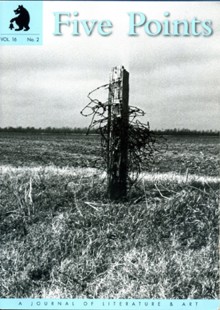Five Points, Vol. 16 No.2
Spring 2015From Meg Pokrass, "During the start of our spontaneous collaboration (there was no plan) I kept wondering if I were dreaming."
Sample Content
Bruce Smith
Tuscaloosa
“In those days it was either live with music or die with noise, and we chose rather desperately to live,” Ralph Ellison says in his essay, “Living with Music” about trying to write in his apartment while being surrounded by a “night-employed swing enthusiast,” a restaurant with “a jukebox the size of the Roxy,” “preaching drunks” in the alley and “a singer in the ceiling.” Ellison finds himself dueling with the latter, caught mid-range between “Negro folk music, sacred and profane” and Western classical music.
In 1998 until 2002, I lived with music, died with noise in Tuscaloosa, Alabama—183 miles from Oxford, Mississippi; Memphis, Tennessee; and Atlanta, Georgia. [You know you’re a Yankee when you measure the distances to somewhere else.] The triangulation was my uneasy, carpet-bagging, existence. 118 and a half miles to Muscle Shoals. 210 and a half miles to Mississippi State Penitentiary, Parchman Farms. Equidistant from William Faulkner, Otis Redding, and W.E.B. DuBois. Or at equal distances from Eudora Welty, Carla Thomas, and Brenda Lee. I lived/died in the axis of the bourgeois ante-bellumism among the legacies of blood and blues.
Like Ellison I listened to the music I found in these places that mentored and tormented me.
“Legacy as task” is philosopher Jonathan Lear’s notion of inheritance:
When we talk of a legacy our speech is often tinged with an ambiguity which suggests ambivalence. There is, of course, the straightforward sense of a bequest—as with Freud’s passing on to us the idea of the repressed unconscious. But there is also a sense of legacy as that which a person did not hand down [but should have]. Here the legacy is a task: it is the unfinished business which the child needs to complete in order to…succeed the parent.
What is the cultural legacy which reveals itself as “ambiguity which suggests ambivalence”? What is the unfinished business? What is it that runs counter to the prevailing culture which the children of the South and hence the children of the United States need to complete? I looked for the answer in the non-narrative, the expressive, the deranged and falsified document of the song.
“Why do we care about singers? Wherein lies the power of songs? Maybe it derives from the sheer strangeness of there being singing in the world. The note, the scale, the chord; melodies, harmonies, arrangements; symphonies, ragas, Chinese operas, jazz, the blues: that such things should exist, that we should have discovered the magical intervals and distances that yield the poor cluster of notes, all within the span of a human hand from which we can build our cathedrals of sound, is alchemical a mystery as mathematics, or wine, or love. Maybe the birds taught us. Maybe not. Maybe we are just creatures in search of exaltation. We don’t have much of it. Our loves are not what we deserve; they are, let us agree, in many painful ways deficient. Song turns them into something else. Song shows us a world that is worthy of our yearning, it shows us our selves as they might be, if we were worthy of the world.”
—Salman Rushdie, The Ground Beneath Her Feet
The hook from OutKast’s 1998 song, “Rosa Parks” went:
Ah ha, hush that fuss
Everybody move to the back of the bus
Do you wanna bump and slump with us?
We the type of people make the club get crunk
That riff was a fever dream and a thieving of something from the legacy of racial desegregation—the violence, “the idea of the repressed unconscious,” and the pride of endurance. It was also inflected with a down-home porch-sitting harmonica, a wood block keeping the beat, echoing the skull’s hollow, and Big Boi and André 3000, the singers/tricksters making a fuss, causing a riot at the club: the apotheosis of the juke joint. Bump and slump. Hush that fuss. On the one hand a muted and subdued assuaging of the trouble. On the other hand a raucous and clamorous stirring it all up. Hootie Hoo, they sang.
(16.2)

